France labour dispute: Wave of strike action nationwide
- 41 minutes ago
- Europe
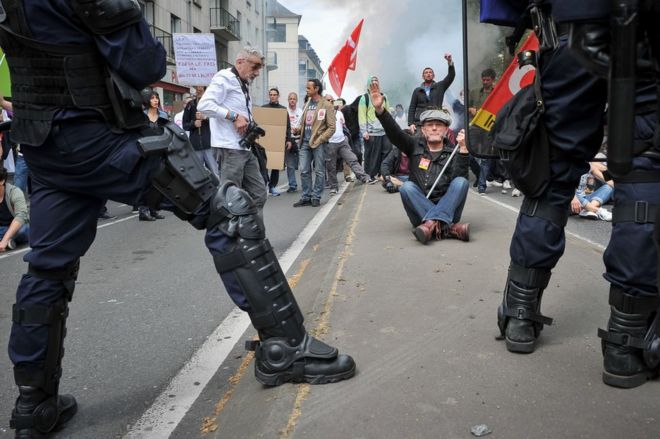 AFP
AFP
Industrial action over labour law reforms is gripping France nationwide, with oil refineries, nuclear power stations and transport hubs affected.
Motorways and bridges were blocked and flights delayed while clashes erupted with police in several cities.
Prime Minister Manuel Valls insists the reforms will not be withdrawn but has suggested they could be "modified".
The action, building over three months, comes two weeks before France hosts the Euro 2016 football championships.
A state of emergency imposed after November's deadly attack by militants from the co-called Islamic State group in Paris remains in place.
The CGT union is leading the action, supported by six other unions including Force Ouvriere and Unef, whereas the more moderate CFDT union backs the labour reforms.
- Stakes rise in French labour protests
- French jokes about fuel shortages
- Violence mars Paris police protest
- Labour reforms: Hollande's last throw of the dice
Dozens of people broke away from a demonstration in Paris on Thursday and set about smashing shop windows and parked cars in a side street.
Masked youths hurled bottles at police, who responded with tear gas.
Elsewhere in France on Thursday:
- Clashes broke out in the eastern city Lyon after a march by at least 3,300 protesters
- In the port city of Le Havre, in Normandy, hundreds of workers took to the streets after blocking off a major bridge
- Riot police held back protesters in the central city of Tours
- Demonstrators invaded high-speed railway lines in the western city of Rennes
- Protest marches were reported in the southern cities of Marseille, Montpellier and Bordeaux

French labour reform bill - main points
- The 35-hour week remains in place, but as an average. Firms can negotiate with local trade unions on more or fewer hours from week to week, up to a maximum of 46 hours
- Firms are given greater freedom to reduce pay
- The law eases conditions for laying off workers, strongly regulated in France. It is hoped companies will take on more people if they know they can shed jobs in case of a downturn
- Employers given more leeway to negotiate holidays and special leave, such as maternity or for getting married. These are currently also heavily regulated
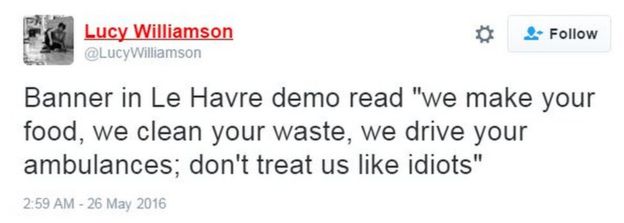 @LUCYWILLIAMSON
@LUCYWILLIAMSON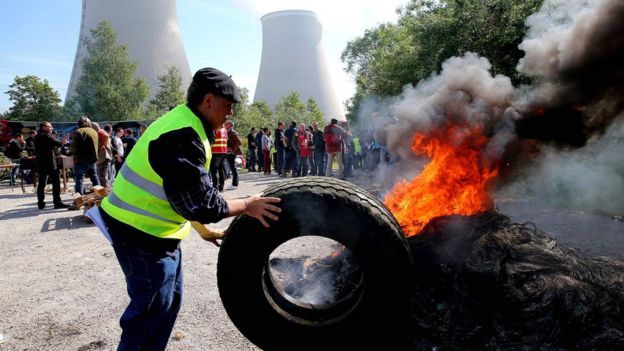 AFP
AFP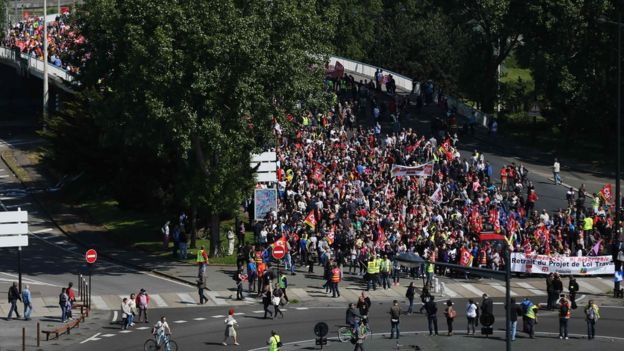 AFP
AFP
Flights to and from Paris, Nantes and Toulouse have been affected, and a rolling strike by train drivers has brought further disruption to regional and commuter rail services.
CGT union members at nuclear power plants voted on Wednesday to join the strike, and the union said 16 of the country's 19 power stations would be affected.
Nuclear power provides about 75% of the country's electricity. Grid operator RTE said nuclear power capacity was being cut by at least four gigawatts, equivalent to 6% of the country's total production capacity, on Thursday, Reuters news agency reports.
Six of France's eight oil refineries have already been hit by strikes and barricades, as have major ports including Marseille and Le Havre.
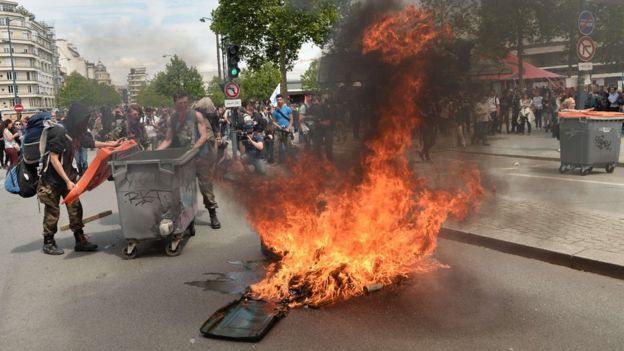 AFP
AFP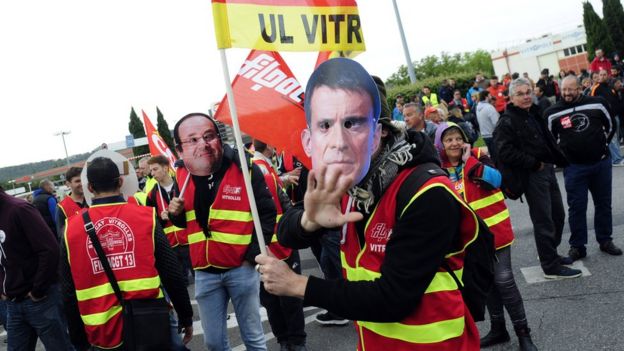 AP
AP
As the union action ramped up on Thursday morning, Mr Valls indicated there might "still be changes, improvements" made to the labour reform laws.
But he rejected Finance Minister Michel Sapin's suggestion that Article 2 of the bill could be rewritten. Article 2 gives individual companies the power to opt out of national obligations on labour protection if they feel they need to - something the CGT union is fiercely opposed to.
Pumps running dry
The French Union of Petroleum Industries says a third of France's 12,000 petrol stations are now running dry.
It said the government had begun using its strategic fuel reserves, which analysts say will last around four months.
Transport Minister Alain Vidalies said 40% of petrol stations around Paris were struggling to get fuel.
Unions were enraged by the government's decision to use a constitutional device allow its watered-down labour reforms to be made into law without parliamentary approval.
The government says the reforms, which make it easier for companies to hire and fire staff, are needed to bring down unemployment.

No comments:
Post a Comment